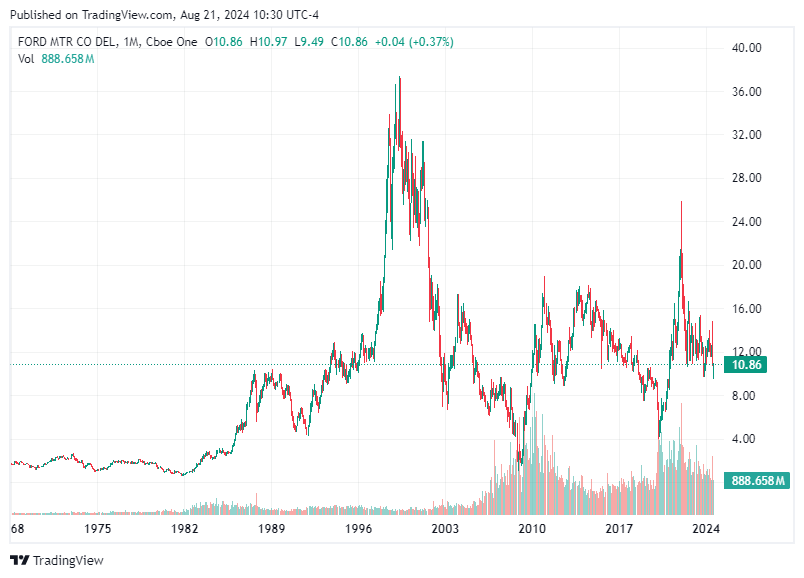Ford To Build Its First Mid-Size EV Pickup Truck
Ford Unveils Plans for Mid-Size Pickup as its First Low-Cost EV.

Disclaimer: The following article is intended to provide an overview of Ford's recent announcement regarding its strategic shift in the electric vehicle market, focusing on the development of a mid-size pickup truck as its first low-cost EV. The content is presented for informational purposes and does not endorse any products or services.
We are working endlessly to provide free insights on the stock market every day, and greatly appreciate those who are paid members supporting the development of the Stock Region mobile application. Stock Region offers daily stock and option signals, watchlists, earnings reports, technical and fundamental analysis reports, virtual meetings, learning opportunities, analyst upgrades and downgrades, catalyst reports, in-person events, and access to our private network of investors for paid members as an addition to being an early investor in Stock Region. We recommend all readers to urgently activate their membership before reaching full member capacity (500) to be eligible for the upcoming revenue distribution program. Memberships now available at https://stockregion.net
Ford Motor Company, a stalwart in the automotive industry, has recently unveiled changes to its electrification strategy, heralding a new era in its vehicle lineup. Announced in August 2024, Ford plans to launch its first vehicle on a newly developed low-cost electric platform—a mid-size pickup truck—by 2027.
Historically, Ford's electrification efforts have leaned towards launching high-end electric vehicles, such as the Mustang Mach-E and the F-150 Lightning. However, the decision to pivot towards a low-cost electric platform for a mid-size pickup truck shows Ford's intention to diversify its EV portfolio. Originally, Ford had planned to release an all-electric three-row SUV but has since opted for hybrid powertrains in that segment. This shift indicates a recalibration of Ford’s strategy to cater to a broader range of customers, particularly those seeking cost-effective and practical electric options.
The introduction of a low-cost EV platform is a decisive move to compete against industry giants like Tesla, which has dominated the market with its luxurious, high-performance electric models. Ford aims to differentiate itself by focusing on affordability without compromising on utility and performance. The mid-size pickup, set to launch in 2027, will cater to consumers who prioritize value, offering more range and usability at a competitive price. Central to this initiative is Ford’s 'skunkworks' team, a group dedicated to innovating and developing next-generation vehicles with a focus on reducing costs and complexity. Headed by former Tesla executive Alan Clarke, this team combines expertise from Ford's acquisition of EV charging startup Auto Motive Power, bringing a wealth of knowledge and experience to the project. The team's mission is to integrate design, engineering, supply chain, and manufacturing processes to create an affordable, scalable electric platform.
This systems-integration approach allows Ford to benchmark against top competitors, ensuring that the new platform meets global standards without sacrificing quality. By streamlining production and enhancing supply chain efficiency, the 'skunkworks' team is pivotal in establishing a competitive cost structure, essential for the success of Ford’s low-cost EVs.
Realignment of Battery Sourcing
A significant aspect of Ford's strategy involves the realignment of its battery sourcing. This move is designed to lower costs and maximize capacity utilization, supporting both current and future electric vehicle production. By enhancing efficiency in battery production, Ford aims to meet stringent compliance requirements and qualify for tax credits under the Inflation Reduction Act, which incentivizes domestic manufacturing.
Ford's collaboration with LG Energy Solutions to relocate some battery production from Poland to Michigan exemplifies this realignment. This shift not only reduces production costs but also aligns with Ford's objective to localize battery manufacturing, thus enhancing its competitive edge in the North American market. In addition, the BlueOval SK joint venture intends to produce battery cells that will power various models, including the new commercial van and the forthcoming electric pickup truck. Ford's pivot extends beyond the introduction of a mid-size pickup. The company is also focusing on broadening its electrification options, particularly in the commercial vehicle segment. Set to commence production in 2026, a new digitally advanced commercial van will be one of the first vehicles off the assembly line, showcasing Ford's commitment to serving commercial customers with efficient, cost-effective solutions.
The decision to incorporate hybrid technologies into its next generation of three-row SUVs highlights Ford's pragmatic approach to electrification. By leveraging hybrid powertrains, Ford aims to overcome the challenges associated with battery costs in larger vehicles, offering enhanced efficiency and performance benefits compared to traditional gas-powered models. This development caters to a segment of consumers who require extended range capabilities for long-distance travel, a feature that pure electric vehicles currently struggle to provide.
Future Plans and Market Impact
Ford's announcement is poised to have a substantial impact on the broader electric vehicle market. As Chinese manufacturers continue to expand their global presence with cost-efficient models, Ford's strategy seeks to counteract this trend by offering affordable, high-quality electric vehicles produced domestically. By reducing production costs and enhancing battery efficiency, Ford can remain competitive while appealing to a wider audience.
The introduction of a low-cost electric truck also aligns with growing consumer demands for more sustainable transportation solutions. As the market for electric vehicles expands, consumers are increasingly price-conscious, seeking vehicles that offer savings on fuel and maintenance. Ford's initiative to provide affordable electric options directly addresses this shift in consumer behavior, positioning the company as a leader in the transition to sustainable mobility. Ford plans to continue innovating within the electric vehicle space, with updates on electrification, technology, and capital requirements expected in 2025.
By prioritizing affordability, utility, and sustainability, Ford is poised to make significant strides in the electric vehicle market. The launch of the mid-size pickup and other electrified models will not only broaden Ford's customer base but also reinforce its legacy of innovation and leadership in the automotive industry. Ford's realignment reflects a comprehensive approach to electrification, balancing affordability with advanced technology. This forward-thinking strategy ensures Ford's continued relevance in a rapidly evolving market, setting the stage for a more sustainable and accessible future in transportation.
Disclaimer: The information presented in this article is based on Ford's public announcements and strategic plans as of 2024. The content aims to provide an objective analysis of Ford's electrification strategy without promoting specific products or services.
We are working endlessly to provide free insights on the stock market every day, and greatly appreciate those who are paid members supporting the development of the Stock Region mobile application. Stock Region offers daily stock and option signals, watchlists, earnings reports, technical and fundamental analysis reports, virtual meetings, learning opportunities, analyst upgrades and downgrades, catalyst reports, in-person events, and access to our private network of investors for paid members as an addition to being an early investor in Stock Region. We recommend all readers to urgently activate their membership before reaching full member capacity (500) to be eligible for the upcoming revenue distribution program. Memberships now available at https://stockregion.net


